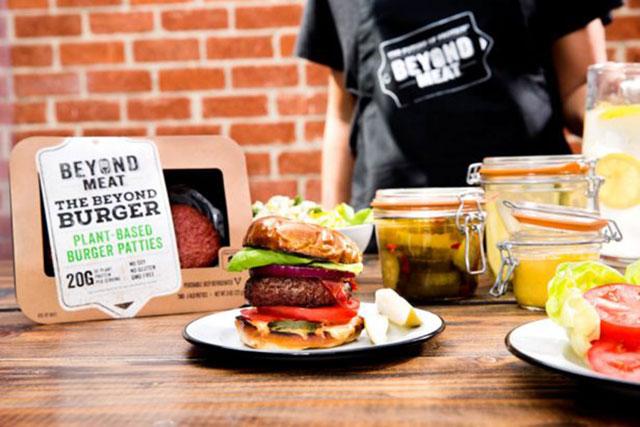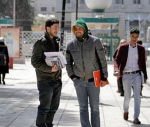You are here
Food safety fears see farming return to high-rise Hong Kong
By AFP - Sep 14,2014 - Last updated at Sep 14,2014
HONG KONG — It’s a rural tradition that faded out decades ago as Hong Kong turned into a neon-lit megacity: rice seedlings being dropped into watery paddy fields with gentle plops.
But now a new wave of farmers are growing the staple again in sleepy Long Valley in the city’s northern New Territories, where buzzing insects and flocking birds offer a rich contrast to the high rise blocks in the distance.
Former supermarket supervisor Kan Wai-hong went from working late shifts to harvesting sacks of fragrant, golden rice.
“In the past people in Hong Kong grew rice,” said Kan, 42, about his move. “I could teach the people again and revive rice farming.”
The naturally farmed rice paddies started reappearing in Long Valley seven years ago after a 40-odd year absence.
Started as part of a bird-friendly wetland conservation project, five farmers now produce around three tonnes of rice a year near the border with Hong Kong’s biggest food supplier mainland China.
It’s a mere drop in the 833 tonnes of rice that Hong Kong goes through every day, but it fetches several times the price of mass-produced imports as part of a growing demand for naturally grown food.
A relentless run of food scandals across the border — from rotten meat in fast-food to dead pigs floating in rivers, recycled “gutter oil”, and heavy pesticide use — has made people rethink the way they shop.
“When food safety in mainland China or even other places is not that good, then Hong Kong people will choose foods that are safer,” said Kan.
“The trend of society has changed, people have become more affluent and they care more about food safety — so more people have come into contact with these products,” he said of the more expensive organic fare.
One of the world’s most densely populated places, the former British colony imports nearly all of its food with just 2 per cent of its vegetables locally grown.
But the number of organic-style vegetable farms has increased from a handful of trailblazers in the 1990s to several hundred today — of which 130 are certified as fully organic.
‘We’re scared’
While still flown in to the semi-autonomous southern Chinese city, homegrown organic vegetables now make up 12 per cent of the 45 tonnes of vegetables the city produces daily.
Shoppers are shrugging off the fact that they cost more than their mass produced counterparts.
“After learning that there are quite a lot of different kinds of pesticides or different ways of growing the plants, I think it’s better to have the organic ones,” Jenny Ho told AFP while browsing one of several weekly organic markets.
“[The food] from Hong Kong does not have to travel so long and is more fresh and delicious as a result.”
Despite the shock of a 2008 melamine-laced baby formula scandal that killed six infants, China’s scares have continued to flare.
Sixteen per cent of the country’s land area was estimated to be polluted, according to China’s environment ministry in April, with almost one-fifth of farmland tainted by inorganic elements such as cadmium.
Among the latest alarms to fuel distrust are chicken feet soaked in hydrogen peroxide and a cook who painted dishes with a banned pigment to look more appealing.
Last year, Hong Kong authorities tested around 65,000 food samples and found only 57 from various countries to be unsatisfactory.
Best practice supply farms are also identified on the mainland, and last month new rules on pesticide residues came into effect.
But apprehension remains. “The government is doing quite a good job in Hong Kong,” said Jonathan Wong, director of the Hong Kong Organic Resource Centre. “We’re scared, but we have a better control system now.”
“Food supply in Hong Kong is still safe but we worry,” Wong added, blaming the regular mainland scandals. “This psychologically makes people in Hong Kong feel worried about the food supply from China.”
High demand
By 1980, 40 per cent of farmland in Hong Kong was reported as abandoned and rice paddies made up less than 1 per cent of what was in use. Today, a total of just seven square kilometres is actively farmed.
While the government provides no farming subsidies, it has encouraged farmers to convert to organic and provides technical support.
But shrinking farmland, also eyed by property developers, is often limited to small plots on short-term leases in the space-challenged city, which is also home to rooftop vegetable gardens and vertical fish farms.
Farmer Thomas Fung lives in Hong Kong’s skyscraper sprawl and commutes to his New Territories patchwork of plots rented from six different landlords on leases ranging from two to five years.
It means even more pressure for the farmers, but those prepared to go organic to meet the city’s changing tastes acknowledge that the fears play to their favour.
“The people are quite afraid of the quality of mainland China veggies, so the demand is very, very big in Hong Kong,” said Fung, one of the city’s self-claimed organic farmers.
Wong Yu-wing, whose nearby family farm is one of the largest to be fully certified, agreed.
“Organic planting is much more better than the traditional method because Hong Kong people are looking for organic vegetables — fresh, planted in Hong Kong — so we have a big market.”
Related Articles
HONG KONG — Start-ups specialising in alternative protein, from eggless eggs to pea-stuffed burgers and cell-grown fish products, are piling
HONG KONG — With their heads in the clouds and their hands in the soil, a group of office workers are busy harvesting the fruits of their la
BEIJING — Chinese state media urged Hong Kongers to “vote to end violence” on Sunday, as record numbers turned out for district elections af


















